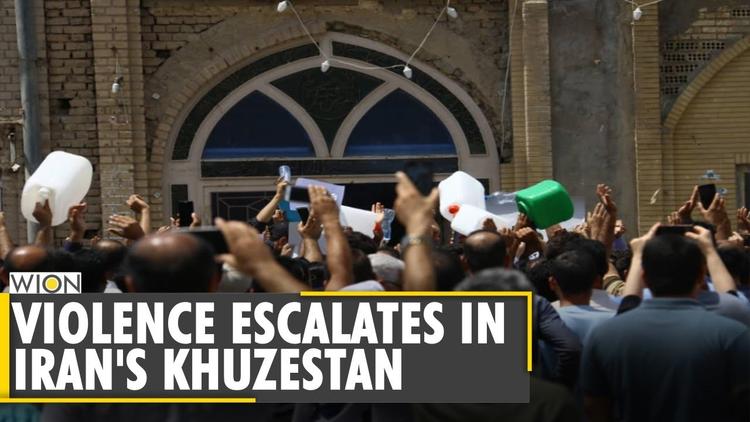From Informed Comment
Iran's southwestern Khuzestan region, the center of its petroleum industry, has been wracked with protests for a week, in part over water shortages. Rallies have erupted in the towns of Mahshahr, Izeh, Ahvaz, Kut-e Abdollah, Susangerd, Aligoudarz and Shoushtar, according to Amnesty International
The Iranian government has sometimes replied to the unrest with live ammunition, drawing rebukes from rights organizations and from the United Nations. Some eight protesters or innocent bystanders have been killed, says, AI, and at least one policeman.
This social unrest is a problem that will be inherited by incoming President Ebrahim Raisi, who has no background for dealing with it other than rounding dissenters up and hanging them.
Outgoing President Hassan Rouhani has insisted that people have the right to protest as long as they remain law-abiding. Even the hard line authoritarian, Ayatollah Ali Khamenei, Iran's "August Leader," has admitted that the protests are understandable according to AP, since water shortages in a hot, arid province like Khuzestan are a serious matter.
Rainfall is down 40% in 2021, and some streams have gone dry.
Sunday's high in the province is 124Â degrees F., and Monday's is forecast as 126Â degrees F. These are some of the hottest temperatures anywhere on earth and just below the all-time record temperature ever recorded, in Death Valley, Ca. Some 4.7 million people live in Khuzestan, out of Iran's 83 million. With water shortages knocking out hydroelectric generation, the big city of Ahvaz has seen major power outages, which mean, no air conditioning.
Omid Shokry at The Atlantic Council observes that Iran is facing its driest summer in 50 years.
The climate crisis is drying out some regions of the world and increasing their average temperature significantly. M.Daneshvar, M. Ebrahimi and H. Nejadsoleymani write, "Among the Middle East countries, Iran will experience an increase of 2.6Â degrees C [4.6Â degrees F.] in mean temperatures and a 35% decline in precipitation in the next decades."
These are some of the more ominous projections about climate for the entire Middle East region- that is, Iran is at the epicenter of the region's climate crisis.
Garrett Nada at the US Institute for Peace Iran Primer observes that there are also serious problems with Iran's water management in the region, with planning and ecological mistakes of Himalayan proportions having been made:
(Note: You can view every article as one long page if you sign up as an Advocate Member, or higher).
| Rate It | View Ratings |
Juan Cole is an American academic and commentator on the modern Middle East and South Asia. He is Richard P. Mitchell Collegiate Professor of History at the University of Michigan. Since 2002, he has written a weblog, Informed Comment (more...)

OpEdNews depends upon can't survive without your help.
If you value this article and the work of OpEdNews, please either Donate or Purchase a premium membership.
If you've enjoyed this, sign up for our daily or weekly newsletter to get lots of great progressive content.
Most Popular Articles by this Author: (View All Most Popular Articles by this Author)
Rupert Murdoch's Fox postpones Pirro, as his Sky Channel is Pulled from NZ Airwaves for airing Shooter's Video
Clouds of War: Russia sends Warships as Turkey kills 45 Syrian Troops and blackmails Europe with Migration
India Doubles Iran Oil Imports: Are Trump's Sanctions Cratering?
Who's Running John Bolton to Start a war with Iran? He worried even Mad Dog Mattis
Top 5 Mistakes GOP's Wohl Made in allegedly framing Mueller for Sex Charges
Trump hands Oil & Gas to Syria & Russia as he claims "We've taken control of the oil in the Middle East"
To View Comments or Join the Conversation:





